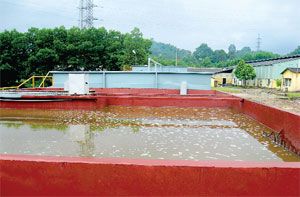More sanctions on environmental protection
 The revised Law on environmental protection has been passed at the 7th session of the 13th National Assembly. It contains 20 chapters and 170 articles and will officially take effect from January 1, 2015. This is seen as an important legal framework for state management of the environment.
The revised Law on environmental protection has been passed at the 7th session of the 13th National Assembly. It contains 20 chapters and 170 articles and will officially take effect from January 1, 2015. This is seen as an important legal framework for state management of the environment.
Deputy Minister of Natural Resources and Environment Bui Cach Tuyen said the revised Law on environmental protection in 2014 helped solve limitations and restrictions of the former law in 2005 and supplements some new contents such as green growth, climate change and environmental security. The law also says that environmental protection should be in harmony with international commitments on environment that Vietnam is involved in.
The basic bright spots of the new law are to build an environment protection planning, supplements regulations on environment protection commitments and on responsibility, rights of localities and the Ministry of Natural Resources and Environment in controlling pollution of water resources in rivers and river valleys.
The new law also says that environment protection is the responsibility and duty of every agencies, organizations, households and individuals. The organizations and individuals who benefit from the environment have duties to contribute money for environment protection while those cause environmental pollution and degradation are responsible for repairing and compensating the damages according to regulations. The law also regulates conditions on environment protection at craft villages and responsibility of people’s committees at communal district and provincial levels regarding environment protection; responsibility on announcing information about environment status and responsibility of state agencies on reporting environment management activities.
The law also supplements waste management principles, responsibilities of consumers, state agencies and productions on retrieving expired and discarded products and responsibilities of investors in industrial parks and processing zones on waste management. The organizations and individuals who reduce waste discharges and conduct waste recycle and reuse will enjoy state’s preferential policies.
It also stressed that environmental protection should be in harmony with economic development, social security, biodiversity preservation and adapting to climate change and suits the country’s laws as well as natural, historical and cultural features and levels of socioeconomic development.
One of the new points regulated in the 2014 Law on Environmental Protection is sanctions on sea and islands environment protection. The Item 1, Article 50, Chapter 5 stipulates that “Waste discharged from the mainland to the sea or risen from the sea and islands must be counted up, classified, evaluated and treated following environment standards”. The Item 2, Article 50 also says “Oil, lubricant, chemicals and other toxic substances after used for activities in the sea and islands must be gathered, stored, transported and treated following regulations on waste management”.
According to the new law, environment protection needs to be related to appropriate use of natural resources and waste reduction. The national environment protection should be associated with regional and global environment protection. This activity needs to be implemented regularly with priorities given to prevention of environmental pollution and degradation which could cause damages to other organizations and individuals.
Especially, leaders of agencies and organizations and civil servants who make use of their rights and posts to violate the law will be penalized or prosecuted based on their violation levels./.
Source: http://ven.vn
